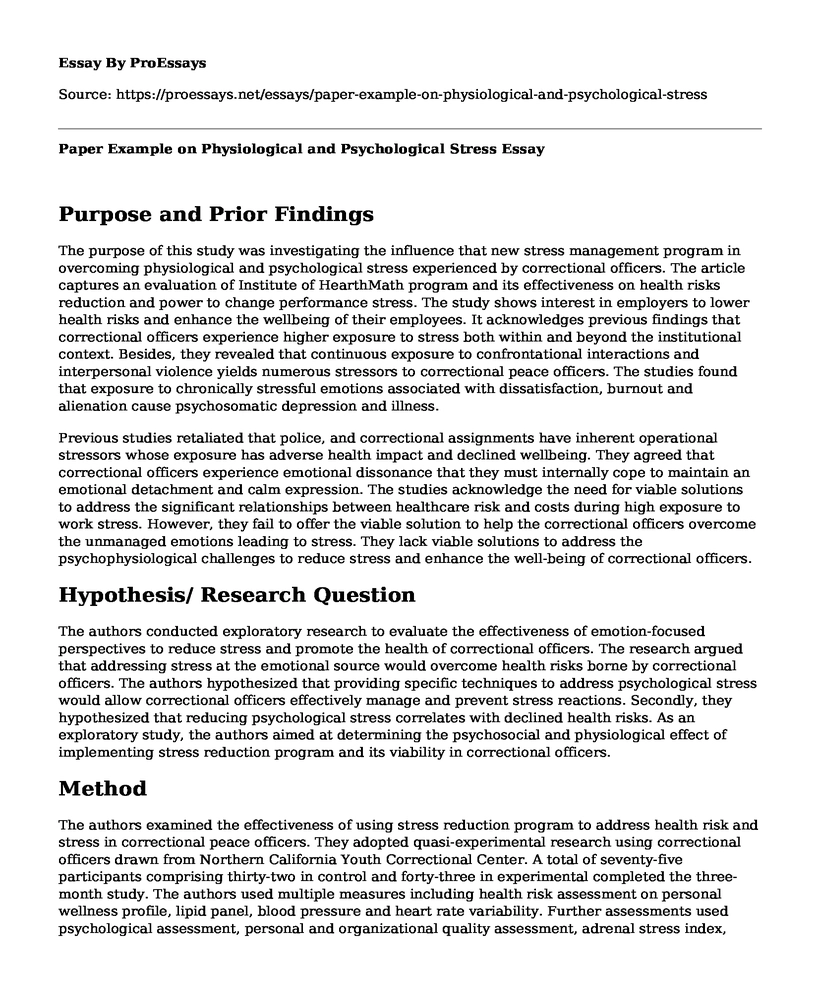Purpose and Prior Findings
The purpose of this study was investigating the influence that new stress management program in overcoming physiological and psychological stress experienced by correctional officers. The article captures an evaluation of Institute of HearthMath program and its effectiveness on health risks reduction and power to change performance stress. The study shows interest in employers to lower health risks and enhance the wellbeing of their employees. It acknowledges previous findings that correctional officers experience higher exposure to stress both within and beyond the institutional context. Besides, they revealed that continuous exposure to confrontational interactions and interpersonal violence yields numerous stressors to correctional peace officers. The studies found that exposure to chronically stressful emotions associated with dissatisfaction, burnout and alienation cause psychosomatic depression and illness.
Previous studies retaliated that police, and correctional assignments have inherent operational stressors whose exposure has adverse health impact and declined wellbeing. They agreed that correctional officers experience emotional dissonance that they must internally cope to maintain an emotional detachment and calm expression. The studies acknowledge the need for viable solutions to address the significant relationships between healthcare risk and costs during high exposure to work stress. However, they fail to offer the viable solution to help the correctional officers overcome the unmanaged emotions leading to stress. They lack viable solutions to address the psychophysiological challenges to reduce stress and enhance the well-being of correctional officers.
Hypothesis/ Research Question
The authors conducted exploratory research to evaluate the effectiveness of emotion-focused perspectives to reduce stress and promote the health of correctional officers. The research argued that addressing stress at the emotional source would overcome health risks borne by correctional officers. The authors hypothesized that providing specific techniques to address psychological stress would allow correctional officers effectively manage and prevent stress reactions. Secondly, they hypothesized that reducing psychological stress correlates with declined health risks. As an exploratory study, the authors aimed at determining the psychosocial and physiological effect of implementing stress reduction program and its viability in correctional officers.
Method
The authors examined the effectiveness of using stress reduction program to address health risk and stress in correctional peace officers. They adopted quasi-experimental research using correctional officers drawn from Northern California Youth Correctional Center. A total of seventy-five participants comprising thirty-two in control and forty-three in experimental completed the three-month study. The authors used multiple measures including health risk assessment on personal wellness profile, lipid panel, blood pressure and heart rate variability. Further assessments used psychological assessment, personal and organizational quality assessment, adrenal stress index, Jenkins activity survey and Brief symptom inventory. The authors applied ANOVA and ANCOVA analysis to compare the pre and post changes.
Results
Baseline comparison using ANOVA showed under-activity, higher diastolic pressure, higher controllable health risk index in experimental than in control group. The comparison of pre-post changes showed directional improvements in the control group across the physiological and psychological measures. The survey results showed that improving organizational climate and increased health awareness provided the greater conscious understanding of stress management associated with reduced health risks. The authors found adoption of stress management reduced stress and associated health risks, resulting in health savings on healthcare expenditure.
Discussion/Conclusions
The authors found the stress and health risk reduction initiative effective to overcome high levels of stress that correctional officers experience on a daily basis. The intervention showed directional improvements suggesting that correctional officers operate under higher levels of stressors in their duties. The study showed that Power to Change Performance initiative proved time-efficient and cost-effective in reducing stress and associated health risks. The implementation of the program effectively enhanced productivity and psychological wellbeing of the correctional officers. It promises a reduction in physiological and psychological stress and savings on healthcare expenses following declined health risks. Stress reduction and enhanced health benefitted individual correctional officers and the organization, hence appropriate intervention to address high risk experienced in high-stress professions.
Critical Review
The evidence of successful reduction of physiological and psychological stress experienced by correctional officers is invaluable to overcome the stressors associated with the high-stress experiences acknowledged by Ted Conover position in New Jack Guarding Sing Sing. The indication of the improved psychological well-being of correctional officers makes the article relevant to overcome stress reactions Conover (2001) found to emerge from violence and confrontational interactions.
Bibliography
McCraty, R., Atkinson, M., Lipsenthal, L., & Arguelles, L. (2009). New Hope for Correctional Officers: An Innovative Program for Reducing Stress and Health Risks. Appl Psychophysiol Biofeedback, 34(4), 251-272.Cite this page
Paper Example on Physiological and Psychological Stress. (2022, Apr 07). Retrieved from https://proessays.net/essays/paper-example-on-physiological-and-psychological-stress
If you are the original author of this essay and no longer wish to have it published on the ProEssays website, please click below to request its removal:
- Paper Example on Deviance Behavior of Lee Malvo and John Muhammad
- Essay Sample on Person Centered Theory
- The Love That Kills: The Story of an Hour Essay Example
- Essay Sample on Maturity and Self-Identity in Short Story Boys and Girls by Alice Munro
- Essay Sample on Caring for People with History of Childhood Trauma
- Book Review Example on The Beast in the Jungle: A Tale of Love and Regret
- Developmental Psychology - Free Report Sample







